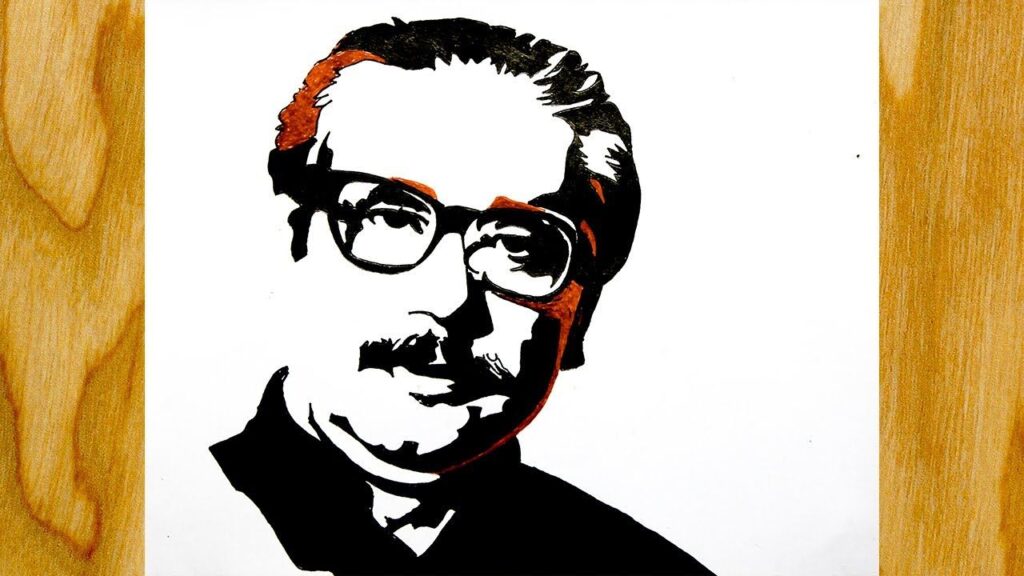DRONA BANDYOPADHYAY
Sheikh Mujibur Rahman is the most well-known figure in Bangladesh. He is also the most controversial personality of Bangladesh too. Popularly known as ‘Bangabandhu’or ‘Friend of Bengal’, he is equally loved and hated by his admirers and adversaries, respectively. It is quite commonplace for a towering personality like Sheikh Mujib to receive love and hate or respect and contempt at the same time even after more than four decades of his atrocious murder along with his family and relations on 15th August 1975.
Sheikh Mujib was an influential man of Bangladesh. He had the most significant role in preparing the country and countrymen conscious of their rights and responsibilities. Whether Sheikh Mujib declared independence or not is not my objective in this write up but the entire saga of the creation of independent Bangladesh in 1971 cannot be imagined without the role and image of Sheikh. It is true that the liberation war of 1971 was fought in his physical absence but his emotional and psychological presence was the most inspiring and encouraging factor for his impoverished countrymen to fight for independence against the Pakistani state for which Sheikh Mujib himself did political fight in 1940s when he was a young student leader of Calcutta (Kolkata).
Mujib was born in 1920 in a Bengali Muslim family. In those times the Bengali Muslim community was undergoing colossal social and political changes. A new politically conscious and socially mobile educated middle class was emerging across Bengal among the Muslims. The decade of 1920s was a shining decade for the Bengali Muslims because this very decade witnessed the establishment of Dhaka University and emergence of Kazi Nazrul Islam, Golam Mostofa, Jasimuddin,S. Wajed Ali , Begum Sufia Kamal , Mohammad Kasem and inauguration of Saogat and Shikha literary period .
It is true that the trait of political and social consciousness in the Bengali Muslim community was communal in nature scope but there was a considerable liberal ingredient within it. This communalistic trend based on religious identity straightly stimulated the demand for a separate Muslim homeland called Pakistan. The Pakistan movement was hugely popular and eventually a successful political movement in the annals of Indian sub-continent. The Bengal and Bengali Muslims were the most vocal and vociferous Muslim ethnic group in undivided India of 1940s. Mujib was the product of this above-mentioned politico-social environment conditioned with pan-Indian Muslim nationalism. His adolescence and youthhood experienced the maturation and advancement of Muslim separatism based on religious community based nationalistic ideas and ideology. These political realities had shaped the political outlook of Sheikh Mujib. This was his primary foundation of politics in truest sense. Despite this fact of his life he admired the heroic and fearless politics of Netaji Subhas Chandra Bose and valorous strikes of his INA. Mujib expressed his respectful adoration for Subhas Bose in his autobiography but at the same time his heart and mind cried for the cause of Muslim homeland and he aligned with the latter. This singular incident is the finest and fittest example to show his emotional swings and decisive commitments.
In his later life Mujib became one of the major national leaders of united Pakistan before 1971 and the main propeller of the autonomy and independence movement of Bangladesh since 1960s.
Throughout his life he was very straightforward and brave in his behavior and played his role withoutany inhibitions. Mujib faced multiple contradictions in his political journey due to prevalence of social contradictions within Bengali Muslim society and political and constitutional contradictions within Pakistan in various stages in undivided India, united Pakistan and newly-created Bangladesh.
Without citing any further example it can be maintained that he was indeed a successful politician who profoundly understood the psyche of his people. Mujib knew that Muslims of Bengal are deeply religious. They follow and practice the Islamic rules and rituals in a very conservative way. Under no circumstance the Bengali Muslms will go against the idea of Pakistan which stands for the emancipation and development of Muslims of India through the realisation of a separate Muslim homeland though they were bitterly experiencing an exploitative behaviour from the ruling elites of Pakistan. This was the core cause behind the genesis of the process of split from united Pakistan. 1971 had brought this particular contradictory situation. Mujib tried his best to coagulate the mutually adversarial forces and interests but failed miserably . The cost of failure was humongous. The genocide of 1971 and politically motivated brutal massacre of 15th August 1975 bear the best testimony of his historically gargantuan failure.

